Nichimo Group’s human resource strategy
At the same time as formulating the Fiscal 2026 Medium-Term Management Plan (the “new medium-term plan”), we also reviewed our human resources strategy.
The new medium-term plan, which has “challenges” as its keyword, is positioned as a three-year plan that will visualize our ideal state in 10 years for each business and create breakthroughs to get there. We have also established the “mindset” that each employee will put into practice in order to achieve our medium- to long-term targets and pursue our Purpose and Corporate Philosophy. We believe that by putting this into practice, we can provide our customers with the best solutions, which will ultimately lead to increased corporate value.
In formulating the plan, we came to reaffirm that in the current situation where paradigm shifts are occurring across every field, it is difficult to predict even the near future, and that the key to our growth is indeed human resources. Once again, we will adhere to our policy of raising the level of our employees (strong individuals), connecting them together, and elevating them into strong organizations. Under this policy, we defined our human resource strategy as “growing people (employees) into stronger individuals and connecting them.” The term “challenge” used in the new medium-term plan is an important guideline for day-to-day work, with each employee setting challenging goals. By working on not only sales aspects but also administrative ones such as improving work efficiency and reviewing the system environment, we aim to link each individual’s “challenge” and raise the overall level of the Company.
Achievement and road map of long-term vision
Connecting strong individuals to business and the future
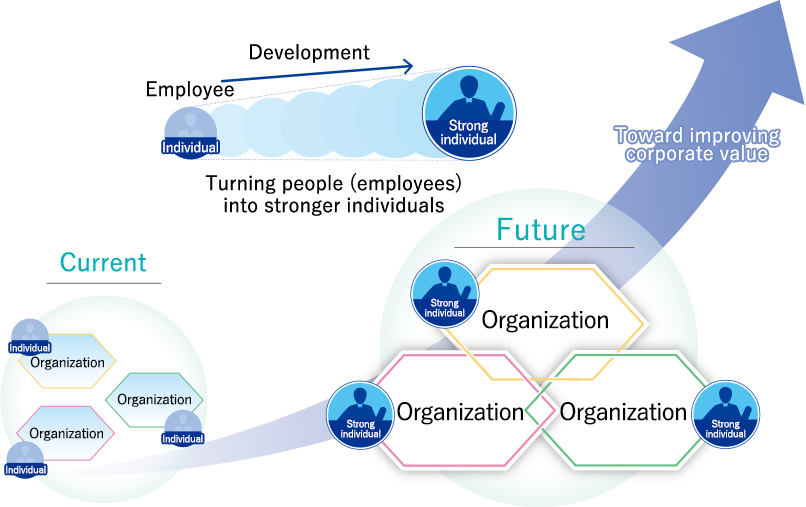
Strong individuals form groups and expand strong organizations,
collaborating to increase corporate value
We have classified the points to focus on for developing human resources who can realize our vision for covering “From Ocean To Dining, Challenges For The Better Future.” We will develop human resources over the medium to long term in two stages.

Company-wide assessment
The second company-wide assessment was conducted in August 2024. The results of this assessment confirmed that, despite a slight drop in affirmative answers overall compared to the previous assessment, the trend of answers remained similar, as employees are highly engaged at the departmental level, including high levels of satisfaction with their own responsibilities and the work environment around them, including interpersonal relationships. On the other hand, the results also showed again that there is a lack of shared direction across the Company in terms of company-wide and management. As a concrete measure to address this area for improvement, we have been holding town hall-style meetings steadily since April 2025. One of the key points in formulating the new medium-term plan is to disseminate the policy throughout the entire Group. We intend to engage in business operations with the entire Group understanding our management policies.
Strengths identified through the assessment and room for improvement
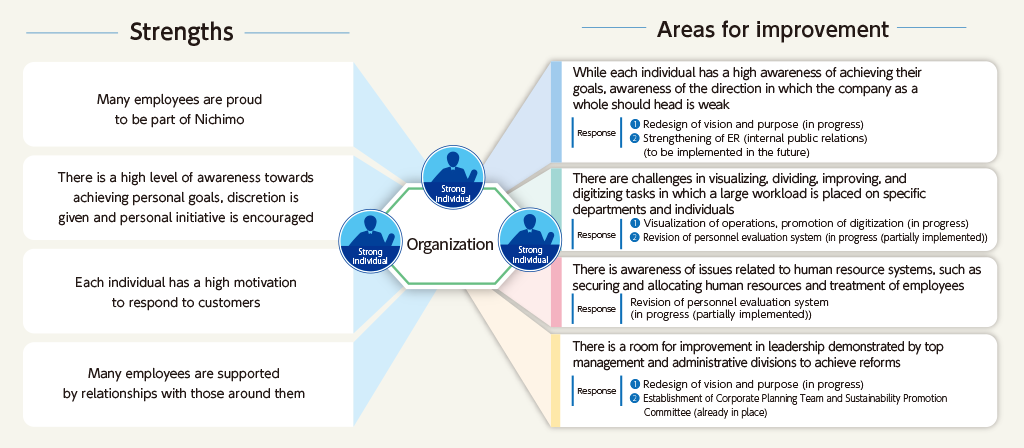
KPI progress
| Item | KPI | Progress | |
|---|---|---|---|
| 1 | Visualization of human resource information and measures | Acquisition of ISO 30414 certification |
|
| 2 | Sharing a Group-wide vision | 100% understanding of the vision |
39% understanding (49% in FY2023, down 10 percentage points year on year)
|
| 3 | Creation of a plan for human resource retention and development | Employee turnover of no more than 5% |
Employee turnover: 4% * Non-consolidated results
|
| 4 | Diversity | Ratio of female hires: 50% Ratio of female managers: 10% or more Rate of men using childcare leave: 100% |
Ratio of female hires: 22%
Ratio of female managers: 0% Rate of men using childcare leave: 100% * Non-consolidated results
|
Promotion of diversity & inclusion
Improving diverse work styles and labor environment
The most important management resource for the Group is our employees, or human resources. We believe that creating an environment in which employees can demonstrate their capabilities as valuable human resources and work hard at their jobs as a valuable asset, despite differences in their environment or situation, is the very core of diversity and inclusion. To that end, we are considering and implementing measures that will enable Nichimo Group employees to harness their abilities irrespective of gender, childcare needs, family care requirements, or disability.
For those taking care of a child or elderly family member, we have systems in place such as telecommuting, reduced working hours, and staggered work shifts. When introducing our telecommuting system, we consult with the human resources team on the individual’s wishes and the execution of work, ensuring that the quality of work is not compromised. Additionally, our telecommuting system can also be used by people other than those caring for a child or elderly family member. Regarding childcare leave for male employees, we not only post information on the intranet, but also provide individual explanations to create an environment that makes it easy for them to go on leave.
We also encourage the employment of people with disabilities as an important asset. We permit them to work from home and host internships from special needs schools. Providing flexibility in work times and locations enables a variety of work styles, and we will continue to strengthen our efforts in this area.
Rate of using childcare leave (%)
| FY2022 | FY2023 | FY2024 | |
|---|---|---|---|
| Men | 50% | 100% | 100% |
| Women | 100% | 100% | 100% |
Systems for realizing diverse work styles and female participation
-
Telecommuting system for childcare or nursing care
- ⇒ By deciding on an approach that incorporates the individual’s wishes and the execution of work, together with the Company, we can offer a telecommuting system that does not compromise work quality.
-
Telecommuting system for regular employees
- ⇒ Regular employees are also permitted to use a telecommuting system once a week in case they need to concentrate on preparing documents or other work.
- Staggered work shift system
- Hourly paid leave system
-
Shortened working hours system for childcare (up to elementary school age)
- ⇒ Consideration of the childcare period before entering elementary school
- Shortened working hours system for nursing care
-
Setting of days to encourage employees to take paid leave
- ⇒ We set recommended days each year to encourage employees to take annual paid leave so that leave is coordinated in a company-wide manner
-
Annual paid leave can be carried over for up to 2 years (medical leave)
- ⇒ The carryover period is set at two years, not only in cases where annual leave is not taken, but also in cases of long-term ill health. Furthermore, up to 15 days of unused annual paid leave can be banked as medical leave.
Soliciting opinions
-
Company-wide assessment
- ⇒ Conducted every year to improve engagement among all employees and identify management issues, with the results made known to employees.
-
Individual interviews with young employees
- ⇒ We check any minor concerns of young employees with 10 years or less of experience by having them meet with human resources personnel.
Training opportunities
-
Video streaming to understand systems
- ⇒ Instead of just posting on the intranet, we use videos to carefully explain the background to system revisions and the key points of systems.
Promoting female participation
We recognize that promoting female participation within the Group is an important issue for achieving our new medium-term plan and increasing our corporate value over the medium to long term. On the other hand, the industry as a whole has not yet established an environment in which women can play a wide range of roles actively. Therefore, we are taking practical measures such as formulating a general employer action plan based on the Act on the Promotion of Female Participation and Career Advancement in the Workplace and increasing the hiring of women. Above all, we are working to create an environment where women can work long-term and with peace of mind.
Improving employees’ health
The Group believes that the foundation of its business operations is ensuring that our employees are healthy and able to continue working with peace of mind. We aim to achieve strong individuals through health management as well. For this reason, it is important for us to carefully build up substantive responses rather than merely taking formal steps. To prevent long working hours, we are setting target times and alerts for overtime work, setting days to encourage employees to take paid leave, visualizing work processes and reviewing work flows to increase productivity, and promoting digital transformation. We maintain a 100% uptake rate for regular health checkups and stress checks. We also provide individual support for follow-up examinations and specific health guidance after regular health checkups. The importance of caring for the mental well-being of employees has increased in recent years. We provide support to employees who are suffering from mental health problems not only through industrial physicians, but also in cooperation with their primary care physician in some cases. We are committed to an environment in which employees can maintain physical and mental well-being and devote themselves to their work. Through these efforts, we are also making preparations to obtain certification as an Outstanding Organization of KENKO Investment for Health.
| FY2022 | FY2023 | FY2024 | |
|---|---|---|---|
| Average monthly overtime work (hours) | 12.1 | 12.2 | 12.6 |
| Rate of taking annual paid leave | 60.1% | 66.3% | 57.9% |
| Health checkup uptake rate (%) | 100% | 100% | 100% |
| Stress check uptake rate (%) | 100% | 100% | 100% |
Round-table Discussion Nichimo’s Human Resource Strategy
Strong individuals are the driving force of our organization
To become a company that creates new value for the future, it is important to grow people (employees) into stronger individuals and connect them.
Mr. Akinobu Kojima, Director and Executive Officer, Ms. Yumiko Yoshie, Outside Director, and Mr. Taketo Kawamata, Human Resources Team Leader, discussed the type of personnel Nichimo is looking for and the direction of the Company’s human resource strategy.
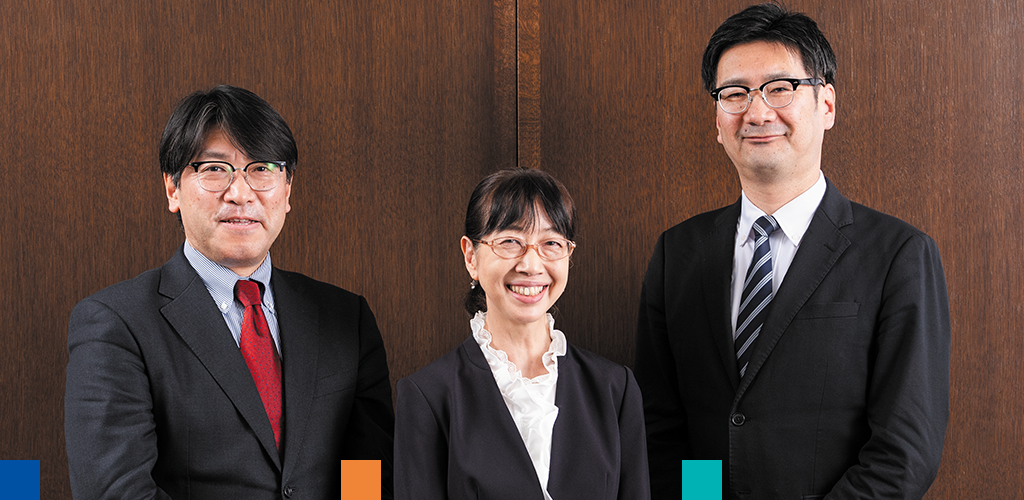
Director, Executive Officer in charge of administrative section
Akinobu Kojima
Outside Director Audit & Supervisory Committee Member
Yumiko Yoshie
Human Resources Team, General Affairs Department Team Leader
Taketo Kawamata
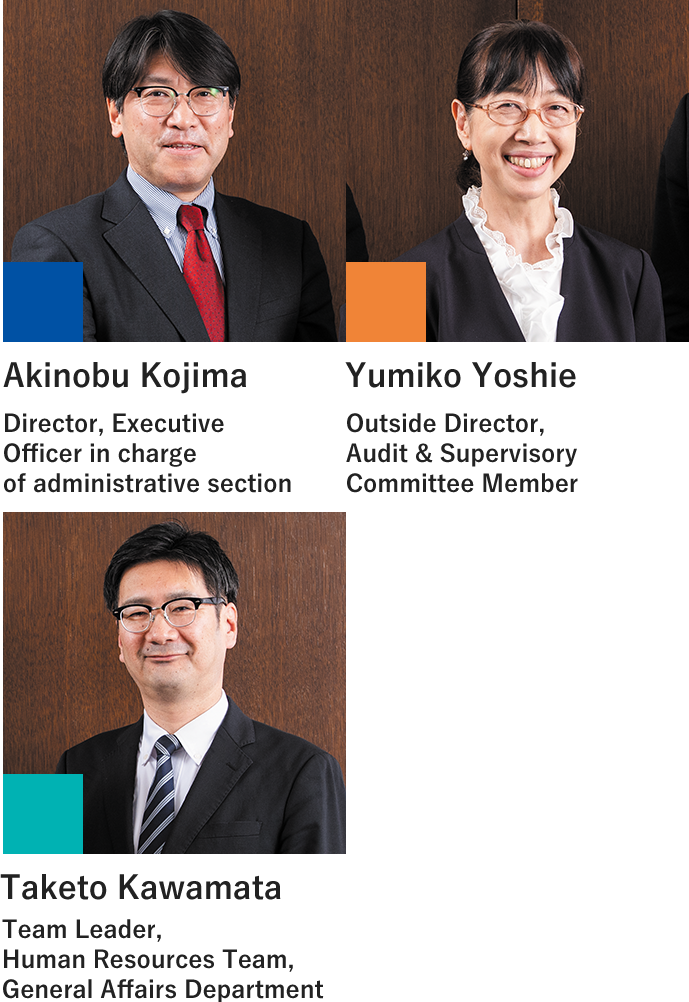
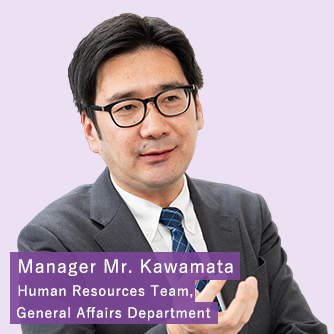
Kawamata
First, I would like to explain the human resource strategy that Nichimo has been pursuing. The key to this strategy is that we aim to “grow people (employees) into stronger individuals and connect them.” The implementation of this strategy is planned in two stages: STAGE 1 through 2025 and STAGE 2 through 2028. The first of the measures undertaken in STAGE 1 was visualization to clarify the skills we are looking for. One example is providing new training opportunities such as videos that can be accessed over the Internet. The second measure was to revise the human resource system from a focus on performance evaluation to process evaluation. The third is the unification and standardization of operations through digital transformation (DX). The theme of STAGE 2 is new roles for human resources. Specifically, we plan to promote women to managerial positions, encourage greater exchanges between Group companies, and establish a job rotation system.
Yoshie
Thank you for the explanation. I’ve been an Outside Director for about a year now, and during that time Nichimo’s unique corporate culture has made a strong impression on me. Maybe it’s because the Company is involved in a variety of marine-related businesses, but I feel that employees have a very stable mindset. Perhaps it’s something common to companies in the marine products industry? Nature is constantly changing, so if employees get too excited or upset about it, their work won’t get done. I feel that employees have a very stable mindset, stay calm and collected, and can get the job done.
Kawamata
I had never looked at the Company from the outside before, so I wouldn’t have guessed that you would have that impression. This is a first for me.
Yoshie
In a typical trading company, there is a strong sense of competition among employees, and you don’t really get the stable mindset that I see in Nichimo. I think that at Nichimo, you place more importance on making sure the work proceeds smoothly and steadily than on competition between departments or employees.
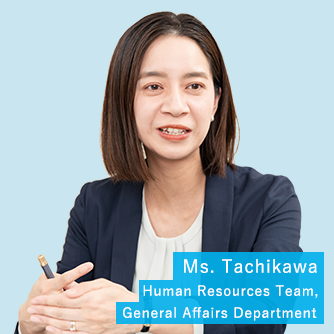
Yoshie
I think it’s a very good thing that Nichimo’s culture places value on the stable mindset. On the other hand, it’s also important to be conscious of increasing the speed of work while maintaining that calm demeanor. It’s important to respond quickly when possible.
Kojima
As you mentioned, I also believe that “challenge” and “speed” will be keywords for Nichimo’s future growth. I have many years of experience in the food business section, and the business environment has undergone dramatic changes in that time. We have been constantly required to take on challenges in areas where we have no prior experience. Of course, I experienced failures along the way, but without an intrepid spirit I would not have been able to move forward. Also, in a job like purchasing, you need to act quickly to beat your competitors. That’s why “challenge” and “speed” are key. Upon reflection, I believe this holds true for every department.
Being willing to take on a challenge requires a sense of responsibility for how things develop afterward. Facing a challenge without responsibility is not a genuine challenge. To that end, Nichimo needs people who can take ownership of their work and act quickly.
Kawamata
To me, training and education is the most important factor in increasing the number of human resources who are mindful of “challenge” and “speed.” The belief that everyone should try their best in their own way will no longer work in the future. Even if we turn a profit, we must be mindful that we do not do anything illegal to do so, and we must take human rights into consideration. That’s why it’s important to learn the best methods and processes for pursuing profits.
Especially in highly specialized departments, people tend to prioritize their own enthusiasm and preferences. This can sometimes result in these same people acting without considering how it will be viewed from a social perspective or objectively evaluated.
To prevent issues such as these from arising, it is important to acquire both work skills and basic standard skills such as compliance. Going forward, it will be necessary to provide training that will generate profits in the right way and help each individual grow steadily.
Yoshie
Yes, we need to improve employee skills in a way that allows the Company to adapt to society. That is certainly important.
Kojima
Nichimo has a corporate culture of entrusting work to individuals, giving employees discretion from a young age, and allowing them to grow while naturally cultivating specialized knowledge in the process. When this is taken too far, though it may foster strong individuals, it may also shift the direction of the organization. That is why adjustments are always needed to ensure that organizational goals and individual actions are in line with each other. Leadership and communication within the team are essential to making these adjustments, and this is directly linked to the growth of the Company.
Additionally, over-emphasis on individualism also makes people more susceptible to prioritizing short-term gains. The current medium-term management plan defines our ideal state in 10 years, but we cannot get there by simply focusing on short-term profits. As Mr. Kawamata says, training is key to solving this problem. We must balance strong individuals with strong organizations. In particular, I think it will be important to create opportunities and systems for training younger employees.
Yoshie
When the business environment changes, the Company’s business model has to adapt accordingly. The type of human resources needed will also change as the business model changes. The skills that are in demand today may be different five years from now. This is why human resource strategies must always be developed with an eye to future changes in the business model.
If you have an ideal state for the Company to be in 10 years, you need to start preparing now by gradually hiring personnel who fit that future business model.
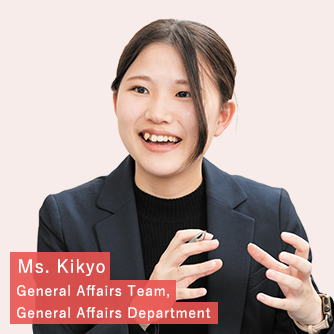
Yoshie
With regards to its human resource strategy, I have seen Nichimo steadily taking action and making forward progress. An important issue going forward will be to publicize these efforts to the outside world. There are various approaches that can be employed. For example, how about hosting student internships in the human resources department? This may increase the burden on the human resources department, but it would be a good opportunity to promote Nichimo’s human resource strategy. If these efforts are sustained, students’ perception of Nichimo will change, and as a result, the Company’s brand value will also increase. You may also want to consider holding joint recruitment information sessions.
Kojima
We are very careful when it comes to recruiting new graduates. I think the fact that we provide more detailed and attentive support than other companies is probably what has led to such good results. Before the COVID-19 pandemic, we also made use of joint information sessions like the one Ms. Yoshie mentioned. Now, recruitment via the Internet is evolving and becoming more mainstream. Using this approach, we meet with students frequently to generate interest. The selection transition rate, which indicates the percentage of students who proceed to the selection process from the information session, is also favorable.
Kawamata
Nichimo’s name recognition is still low, and with society as a whole facing the problem of labor shortages, it has been quite difficult to recruit the desired personnel. In order to strengthen human resources under these circumstances, it is critical to establish a system that promotes development of human resources within the Company, even if recruitment does not go as planned. The key is to determine how to best make new employees who join the Company valuable, contributing assets.
Yoshie
There is a growing trend among many companies to encourage employees to take maternity leave, childcare leave, and family care leave. The same is true at Nichimo, as an increasing number of employees are taking childcare leave for their second or third child. Going forward, the Company will likely see an increase in employees taking advantage of these systems and leaving the Company for three to five years. What is important here is to have a system in place that allows employees who have taken long leave to return to work smoothly and to create a workplace atmosphere that supports this. I would like Nichimo to not only improve its human resource system, but also to create an environment in which returning employees can work comfortably. Employees who are keen to return even after a long break have a strong work ethic. Many feel refreshed after taking such leave and bring more energy to their work.
One of the key ways to change corporate culture is active participation of women. Creating an environment where it is easy for women to work will help change the corporate culture. In the past, many female employees left their jobs due to marriage or childbirth, but today, more women are choosing to continue working. As a result, more and more new jobs are being created.
Kojima
Women’s participation in the workforce is also an important issue in the business world. For example, in the Food Business, jobs that involve working on boats at fishing grounds or traditional purchasing sites have been difficult for women to enter. On the other hand, I believe that women’s unique ideas can be easily utilized in processed food industry. As we plan to expand our processed food business, promoting diversity, including encouraging women to play active roles, will be vital for future growth.
Kawamata
I think the marine products industry is one of the industries where women are not likely to advance. As Mr. Kojima pointed out, it is true that there are some workplaces where it is simply difficult for women to enter. However, as the limits of traditional business practices become apparent, it is essential to incorporate new values, such as women’s ideas, and create new styles of business. This is an issue that needs to be addressed not just by Nichimo, but by Japanese society as a whole.
Yoshie
Human resource strategy is now a major issue for every company. As a researcher, I come into contact with a variety of information about corporate management. Although my contribution may be small, I always try to find and share information that Nichimo can utilize.
Kojima
One of the roles of the Director in charge of the administrative section is to review systems while taking a bird’s-eye view of the entire administrative section, including the organization, systems, and human resource system. Nichimo is still a small company, so it may be difficult for us to adopt the same methods as the leading examples of larger companies. Nevertheless, we need to quickly find answers to the questions of how to refine our human resources strategy by learning from the success stories of others and create organizations in which women can thrive. Just like with the new medium-term management plan, I would like to picture where I want to be in 10 years, and then backcast from there to figure out what I need to do now to move toward that future.
Kawamata
I believe that the fundamental mission of a company is to sustain its business operations for the long term. It is important that each employee grow to the point where they can think about not just their own work, but also the Company as a whole. If more employees are conscious of their own growth and enriching their lives, while also noticing issues within the organization and being able to point them out, the organization will definitely become stronger. If we have more employees like this, Nichimo will be more stable and able to build a better future. Of course, the current issues are important, but I would also like to think about measures to develop objective employees who are at least somewhat conscious of the future, other departments, and the Company as a whole.

